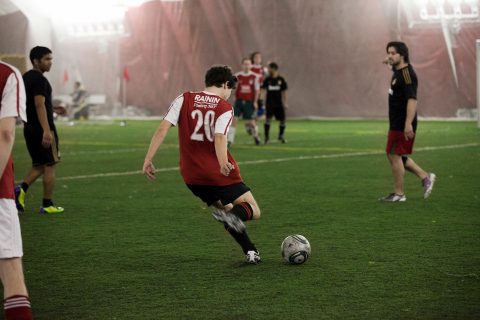Therapeutic Recreation (BA)
Special funding for out-of-province students
Up to $4000 for undergraduate programs.
Why study Therapeutic Recreation?
When you study Therapeutic Recreation, your passion for people shapes you into an agent for change. As a therapeutic recreation specialist, you assess individual leisure needs in order to design specialized programs for individuals with physical, social, intellectual, or emotional disabilities. You may work alongside a team of occupational and physical therapists and social workers to maintain or improve a client’s quality of life and enhance his or her independence.
The curriculum bridges the classroom and the outside community, giving you real-life experiences that hone your leadership and teamwork skills. You’ll also:
- Understand individual and societal influences on leisure behaviour in the practice of therapeutic recreation and administration
- Learn to assess individual and community needs in order to develop, coordinate and implement special events and programs for diverse populations
- Engage in fieldwork with community organizations to evaluate the success of therapeutic recreation programs
Concordia’s hands-on approach provides a solid foundation for future graduate studies in such fields as recreation and leisure studies, organization or community development or public or business administration. Students graduate with practical skills that let them flourish in the health-care services sector.
Program highlights
- Gain a credential to lead community groups and have a positive impact on peoples’ lives
- Unique hands-on approach mixes theory and practice
Program structure
A Bachelor of Arts or Science degree takes a minimum of three or four years (90 – 120 credits) of full-time study, depending on your academic background.
Program option
- Specialization in Therapeutic Recreation (60 credits)
The program's curriculum is designed for students interested in planning and implementing Recreation and Leisure Services for people with compromised health conditions, disabilities and other disadvantaged social conditions.
Courses
United States students: A U.S. Federal Student Aid-eligible version of this program is offered. This version meets all U.S. regulations (such as no co-operative education or e-courses) for eligible programs.
Admission criteria
Minimum cut-off averages and course requirements
- Quebec Cegep: 22
- High School: B-
- ACT or SAT is NOT required
- Canadian curricula course requirements
- Accepted international qualifications
- International Baccalaureate (IB) diploma: 27
- Baccalauréat français: 12
- British system of education (GCE):
- A-levels: At least two A-level exams CD or
- AS-levels: At least 4 AS-level exams with equivalent results or
- BTEC: Level 3 Diploma or Extended Diploma in a related subject area with equivalent results
- Additional information for British System of Education (GCE) applicants
- University Transfers (internal/external): B-
Minimum cut-off averages should be used as indicators. The cut-off data may change depending on the applicant pool. Applicants who meet the stated minimum requirements are not guaranteed admission to these programs.
Application deadlines

FALL TERM
March 1 is the deadline to apply for fall term entry. International students are encouraged to apply by February 1 to allow sufficient time for CAQ and study permit application processing.

WINTER
November 1 is the deadline to apply for winter term entry. International students are encouraged to apply by September 1 to allow sufficient time for CAQ and study permit application processing.
Not all programs are available for winter term entry. Please check program availability for the term, before you start your application.
We reserve the right to close admission to a program at any time after the official deadline without prior notice.
Student stories

Scarlet Guy
Bachelor of Arts Honours History: Public History
Find out how Scarlet Guy discovers a world of interdisciplinary learning and community support in the Faculty of Arts and Science.
Other programs of interest

The Athletic Therapy program will help you develop the knowledge and practical skills needed for injury prevention, emergency services, and rehabilitation.
Department
Department of Health, Kinesiology, and Applied Physiology
Faculty

Expertise in human relationships in the community and the workplace sets you on a path towards the helping professions.
Department
Department of Applied Human Sciences
Faculty

When you study leisure sciences, you learn administrative and programming skills that help you develop leisure programs for all ages.
Department
Department of Applied Human Sciences
Faculty


